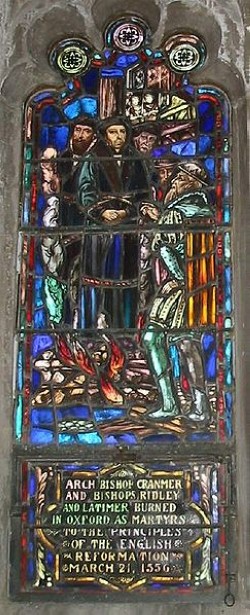Thomas Cranmer (2 July 1489 – 21 March 1556) was a leader of the English Reformation and Archbishop of Canterbury during the reigns of Henry VIII, Edward VI, and for a short time, Mary I. During Cranmer's tenure as Archbishop of Canterbury, he was responsible for establishing the first doctrinal and liturgical structures of the reformed Church of England. When Edward came to the throne, Cranmer was able to promote major reforms. He wrote and compiled the first two editions of the Book of Common Prayer, a complete liturgy for the English Church. His legacy lives on within the Church of England through the Book of Common Prayer -- not only for those within the Anglican Communion but also within the liturgical documents of most English speaking Christians. Not the least of which, the Lutherans enjoy the legacy of his craft with words that continue to inform and shape our faith to this very day.
One reason for enduring character of Cranmer’s liturgical writings was his respect for antiquity as well as his ability to place into timeless form the phrases that, in our own day, have been rendered almost so vulgar and crude as to betray their lineage to his pen. We would do well in our own age and time to remember his gift with words and to carefully and deliberately set out the liturgical language of the Church so fully and yet eloquently exploring the full reaches of language, grammar, and form. Rome has only now done something about the flat and wooden language of the Vatican II mass and is attempting to repair what several generations have undone. The butchery done to the ancient hymn texts by those who would modernize the old has left future generations with the same need to re-learn a language that is as noble as it is successful in communicating what it says.
For those who would suggest that I speak too much for this man as God's gift to the language of the Church (at least in English), read through some of his more familiar and finer phrases.
The peace of God, which passeth all understanding, keep your hearts and minds in the knowledge and love of God, and of His son Jesus Christ our Lord: and the blessing of God almighty, the Father, the Son, and the Holy Ghost, be amongst you and remain with you always.
Almighty and most merciful Father,
we have wandered and strayed from your ways like lost sheep.
We have followed too much the devices and desires of our own hearts.
We have offended against you holy laws.
We have left undone those which that we ought to have done;
and we have done those things that we ought not to have done...
And we most humbly beseech thee of thy goodness, O Lord, to comfort and succour all them, who in this transitory life are in trouble, sorrow, need, sickness, or any other adversity.
Lighten our darkness, we beseech thee, O Lord; and by thy great mercy defend us from all perils and dangers of this night.
Speak now or forever hold thy peace (what movie script could hold a wedding without these words?)
From all blindness of heart, from pride, vainglory, and hypocrisy; from envy, hatred, and malice, and all uncharitableness, Good Lord, deliver us...
To have and to hold from this day forward, for better for worse, for richer for poorer, in sickness and in health, to love and to cherish, till death us do part...
Earth to earth, ashes to ashes, dust to sut; in sure and certain hope of the resurrection unto eternal life.
Almighty God, unto whom all hearts be open, all desires known, and from whom no secrets are hid; Cleanse the thoughts of our hearts by the inspiration of thy Holy Spirit, that we may perfectly love thee, and worthily magnify thy holy name, Through Christ our Lord. Amen.
Ahhh... where are the poets and wordsmiths today to guide us to speak God's Word to one another and speak back to God what He has first spoken to us...

5 comments:
The last distinguished wordsmith in
the LCMS was Martin H. Franzmann.
He was a humble scholar who was a
poet, hymn writer and author.
Above all else he was an excellent
Lutheran theologian who knew that
Christ is the center of our faith.
Cranmer still speaks today. I love my 1928 BOC!
I wonder if Cranmer had a editor to work around, a useage handbook to conform to and committee to undo much of what he wrote? Harvey Mozolak
I think you may have "Lutheranized" a couple of your examples just a bit.
My BCP 1928 gives in the General Confession "We have erred and strayed from thy ways ..." rather than wandered.
Also, several places where you have replaced "thy", "thou", etc.
Good post, and there is no question about the lasting impact of Cranmer on the English language.
One need only scratch the surface of the Cranmer's work to see the lifeblood of the German Reformation. By the grace of God much of Luther's theology and practice was incorporated into the BCP.
Post a Comment